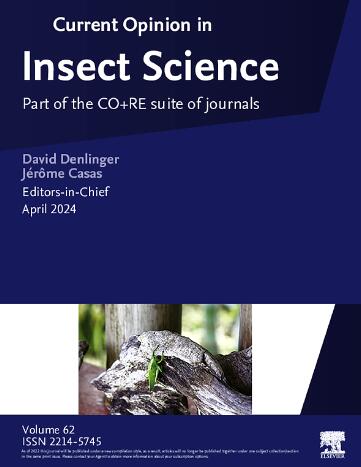女王竞争的进化是为了提高生产力。
IF 4.8
1区 农林科学
Q1 BIOLOGY
Current opinion in insect science
Pub Date : 2025-12-01
Epub Date: 2025-07-15
DOI:10.1016/j.cois.2025.101413
引用次数: 0
摘要
一些作者认为,群居昆虫工蜂可能通过从竞争的候选者中选择最肥沃、最健康或最具活力的蜂王来提高群体生产力。这代表了社会进化的一个不同寻常的假设:群体成员可能通过培养群体内的直接适应竞争来获得间接适应。我回顾了这一假设的现状,并强调了关键的未解决的问题。最近的结果来自于南美洲的肾上腺碱黄蜂强调了有效比较分析的潜力。需要结合野外实验、系统发育和博弈论模型,对不同的群居昆虫进行研究,以检验群体内竞争促进生产力的适应性的可行性。本文章由计算机程序翻译,如有差异,请以英文原文为准。
The evolution of queen competitions to boost productivity.
Several authors have argued that social insect workers may boost colony productivity by selecting the most fertile, healthy, or vigorous queens from pools of competing candidates. This represents an unusual hypothesis for social evolution: group members may gain indirect fitness by cultivating within-group direct fitness competition. I review the status of this hypothesis and highlight key unsolved questions. Recent results from the epiponine wasps of South America underscore the potential for effective comparative analyses. A combination of field experiments, phylogenetics, and game theoretic modelling across diverse social insects is needed to test the plausibility of adaptations fomenting within-group competition to boost productivity.
求助全文
通过发布文献求助,成功后即可免费获取论文全文。
去求助
来源期刊

Current opinion in insect science
BIOLOGYECOLOGYENTOMOLOGY-ECOLOGY
CiteScore
10.40
自引率
1.90%
发文量
113
期刊介绍:
Current Opinion in Insect Science is a new systematic review journal that aims to provide specialists with a unique and educational platform to keep up–to–date with the expanding volume of information published in the field of Insect Science. As this is such a broad discipline, we have determined themed sections each of which is reviewed once a year.
The following 11 areas are covered by Current Opinion in Insect Science.
-Ecology
-Insect genomics
-Global Change Biology
-Molecular Physiology (Including Immunity)
-Pests and Resistance
-Parasites, Parasitoids and Biological Control
-Behavioural Ecology
-Development and Regulation
-Social Insects
-Neuroscience
-Vectors and Medical and Veterinary Entomology
There is also a section that changes every year to reflect hot topics in the field.
Section Editors, who are major authorities in their area, are appointed by the Editors of the journal. They divide their section into a number of topics, ensuring that the field is comprehensively covered and that all issues of current importance are emphasized. Section Editors commission articles from leading scientists on each topic that they have selected and the commissioned authors write short review articles in which they present recent developments in their subject, emphasizing the aspects that, in their opinion, are most important. In addition, they provide short annotations to the papers that they consider to be most interesting from all those published in their topic over the previous year.
 求助内容:
求助内容: 应助结果提醒方式:
应助结果提醒方式:


